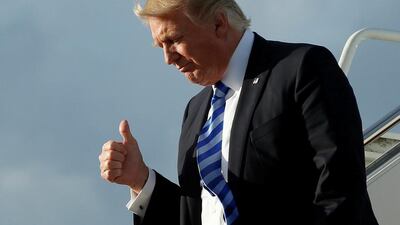Washington is finally noting Donald Trump’s stunning reversals and how little of his maverick candidacy is being reflected in White House policies. Yet one terrifying consistency between his campaign and administration is usually still overlooked: the white-nationalist reconceptualisation of immigration policy under attorney general Jeff Sessions.
Mr Trump’s volte-faces are indeed dramatic, and by no means all bad.
On foreign policy, he is suddenly confronting Russia and embracing China, which he has exonerated of currency manipulation. He charged into a new Middle East military campaign, but against the Bashar Al Assad regime, rather than ISIL, in Syria. Nato is no longer obsolete, it’s indispensable. So is the export-import bank, which shouldn’t be eliminated after all. Even NAFTA, formerly “the worst trade deal ever,” should be tweaked, not scrapped.
On domestic policy, Mr Trump’s proposed budget reflected virtually none of his populist promises to the working class and instead dutifully regurgitated a small-government conservative wishlist. He’s still trying to gut the health care protections he solemnly vowed to preserve. Amid no sign of his promised massive infrastructure programme, major cuts are planned to existing spending.
The federal hiring freeze has been abandoned for “a smarter plan”. Unemployment statistics were completely phoney, but now are suddenly accurate. Meanwhile, the Washington “swamp” not only hasn’t been “drained”, it’s been generously irrigated. And Federal Reserve chairwoman Janet Yellin no longer needs to be “ashamed of herself”. She can probably even stay on, since he suddenly “likes” and “respects” her.
The narrative of Mr Trump’s political adolescence suggests the rising influence of relative moderates led by two key advisers: Mr Trump’s son-in-law, Jared Kushner, and Gary Cohn, chairman of the National Economic Council. They are described as having sidelined Steve Bannon, Mr Trump’s chief strategist.
Mr Bannon was recently removed from the principals committee of the National Security Council and dismissed by Mr Trump as just “a guy who works for me”. There is undeniably a correlation between Mr Bannon’s personal eclipse and the evaporation of most of his political priorities.
However, Mr Bannon was never the driving force behind the most disturbing of Mr Trump’s positions. It is Mr Sessions who has been, and remains, at the epicentre of Mr Trump’s most dystopian deviations from traditional American policies, particularly on immigration.
Mr Sessions is leading the charge to hire 20,000 new border security and immigration officers, and unleash them in a nationwide rampage to jail and deport as many undocumented migrants as possible. All the undocumented will now be treated as dangerous desperados, and anyone who brings such migrants, even their own children, into the US will face serious criminal charges.
Mr Sessions has ordered federal prosecutors to prioritise deporting harmless and productive undocumented migrants.
Across the country, the authorities are cracking down on Mr Trump’s “bad hombres”, such as Maribel Trujillo-Diaz, an otherwise blameless woman who has lived for 15 years without documentation. She now languishes in jail awaiting deportation and separation from her four US-citizen children.
Like its companion programme, the infamous “travel ban”, which would bar entry to most refugees and citizens of six Muslim-majority countries but remains stalled in the courts, the malevolent Sessions approach to immigration can only be understood from a white-nationalist perspective.
These manifestly half-baked rationalisations – “law and order,” and counterterrorism, respectively – for throwing people out of the country or keeping them from coming in, are unconvincing disguises for the obvious real reason: their identity. And that only makes sense in this ethnic-nationalist context.
When Mr Bannon interviewed Mr Trump on his radio programme, they agreed immigration was, generally, bad. But Mr Trump suggested corporate chief executives of Indian origin should be considered exceptions. Mr Bannon objected, insisting: “A country is more than an economy. We are a civil society.” Apparently, that’s a new politically-correct right-wing euphemism for racism.
When Mr Bannon interviewed Mr Sessions, there was no such dispute. Indeed, Mr Sessions enthusiastically praised an infamous 1924 racist immigration law intended to end “indiscriminate acceptance of all races” into the US.
This white-nationalist perspective renders many otherwise incomprehensible prescriptions suddenly legible. Various absurdities, including the inexcusable persecution of innocent people, are rendered irrelevant, since the exclusion of any non-white individual, under whatever pretext, is one less blow to American “civil society.” Yes, they actually think this way.
Mr Bannon may be marginalised. And, on most counts, Mr Trump is becoming a garden-variety conservative, stripped of his populist patina.
But where Mr Sessions dominates, especially on immigration, the Trump campaign’s white-nationalism thrives, and is now poised to destroy countless innocent lives and seriously damage American society.
Hussein Ibish is a senior resident scholar at the Arab Gulf States Institute in Washington
On Twitter: @ibishblog


